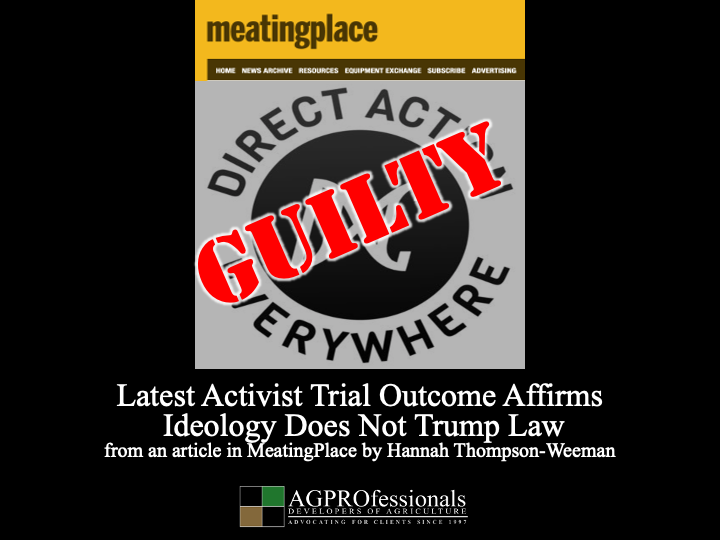Last week’s conviction of Direct Action Everywhere (DXE) activist Zoe Rosenberg should serve as a clear reminder: Passion does not place anyone above the law.
A Sonoma County jury found Rosenberg guilty of felony conspiracy, trespassing, and vehicle tampering after she entered a Petaluma Poultry processing facility (owned by Perdue Farms) in 2023 and removed four live chickens. Rosenberg, who has been active in DXE since she was a teenager, recorded and publicized the event as an “open rescue,” claiming to have “saved” the birds from poor conditions. She now faces up to five years in prison when sentenced in December.
The jury reached its verdict after just a few hours of deliberation. That efficiency says a lot. Despite emotional arguments about “compassion” and “rescue,” jurors were able to quickly cut through the rhetoric and recognize what this case really was: a deliberate, coordinated act of trespassing and theft.
As I said in our statement after the verdict, “The crimes committed by DXE extremist Zoe Rosenberg are just that — crimes.” It’s encouraging that the jury came to that conclusion so swiftly. Laws cannot be bent or ignored because of extreme ideologies or personal moral codes.
We often hear activists justify these stunts by claiming they are acting out of necessity to prevent animal suffering. But when individuals break into secure facilities, they endanger the very animals they claim to protect. Trespassing into barns or processing plants risks introducing disease pathogens, stresses animals already under veterinary supervision, and disrupts carefully managed operations designed for safety and welfare.
This case is not an isolated incident. It’s part of a broader escalation in activist behavior that prioritizes attention and disruption over genuine continuous improvement in animal welfare. DXE and similar groups have turned “open rescues” into made-for-social-media events, complete with police liaisons, trainings on how to react if arrested, and camera crews and press releases ready to go before the animals are even removed.
During the trial, Rosenberg and fellow activist Raven Deerbrook admitted under oath that they had:
• Broken into Petaluma Poultry multiple times
• Disguised themselves as Petaluma Poultry employees
• Created and used fake ID badges with Rosenberg’s photo and a fake name
• Accessed and went through confidential corporate records and data
• Stolen livestock from Petaluma Poultry, Reichardt Duck Farms, and from a Hunter Lane facility
• Attached GPS trackers to 12 trailers
• Cut the fence at the Petaluma Poultry facility
• Placed hidden cameras inside Petaluma Poultry and took photos of the facility
It’s important to call this what it is: performance activism. It does nothing to improve animal welfare, support farmers, or educate the public. It does, however, create security threats, biosecurity hazards, and confusion for consumers who are already trying to navigate a complex food system.
Farmers and processors across the country take animal welfare seriously. Every day, they follow science-based care standards and undergo audits, training, and third-party certification to ensure animals are treated humanely and handled responsibly. None of that gets clicks, but it’s the real story of animal agriculture.
Rosenberg’s conviction reinforces that there are real consequences for crossing the line between advocacy and criminality. Courts in multiple states have made it clear that “rescuing” animals without permission is not a moral act. It’s theft. Those decisions matter not only to protect farmers and employees, but also to preserve the rule of law that underpins every industry and community.
This verdict also provides reassurance to everyone working in agriculture that the justice system can still distinguish between lawful activism and unlawful extremism. People absolutely have the right to advocate for causes they believe in. What they don’t have is the right to invade private property, steal animals, and endanger livelihoods in the process.
It’s worth remembering that the system activists like DXE attack is the same system that has allowed America to provide affordable, abundant, and increasingly sustainable protein to families worldwide. Our farmers and processors invest heavily in welfare, food safety, and environmental progress. They are the true caretakers of animals, both because it is the right thing to do and because their livelihoods depend on it.
This case should mark a turning point in the conversation. Activists can keep pushing their ideology, but the rest of us will continue doing the hard work of feeding people, caring for animals, and respecting the law that protects both.

